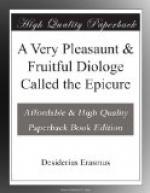which would chauge precious stones for glasse. _HE._
You meane that would lose the godly pleasures of the
mynde, for the coloured pleasures of ye body. _SP._
That is my meanyng. _HE._ But nowe let vs come to
a more perfecter supputation, neither the agewe ||
nor yet pouerty foloweth alwaies carnal pleasure,
nor the new leprosy or els the palsy wait not on at
al times the great & excessiue vse of lecherye, but
grudge of cosiece euermore is a folower & sure companio
of al vnleaful pleasure, then the which as it is plainly
agreed betwixt vs, nothyng is more miserable. _SPV._
Yea, rather it grudgeth their coscience sometyme before
hande, & in the self pleasure it pricketh their mynde,
yet ther bee some that you woulde say, want this motion
and feelyng. _HE._ Thei bee nowe therfore in worse
estate & coditio. Who would not rather feele payne,
then too haue hys body lacke any perfecte sence, truly
from some ether intemperatnes ||D.iiii.|| of euel
desires, euen like as it were a certayne kynde of
drunkenes, or els wont and comune haunt of vice which
ar so hardened in them, that they take a way ye felyng
& cosideration of euyl in their youth, so that wha
agee commeth vpo them beside other infinitie hurtes
and perturbations agaynst whose commyng thei should
haue layd vp the deedes of their former lyfe, as a
special iuwel and treasure: then thei stande greatly
in fear of death, a thyng emongist all other most
ineuitable, & that no man canne shonne: yea,
and the more they haue heretofore been dysmayed and
lacked their sences, the greater now is their vnquietnes
and grudge of || conscience, then truely the mynde
is sodenly awaked whether it wol or noo, and verely
wher as olde agee is alwayes sad and heuy of it selfe
for as muche as it is in subiection and bondage vnto
many incommodities of nature, but then it is farre
more wretchede and also fylthye, if the mynde vnquiet
with it selfe shal trouble it also: feastes,
ryotous banketyng, syngyng, and daunsynge, with manye
suche other wanton toyes & pastimes which he was communely
yeoue vnto & thought very plesaut when he was young,
bee nowe paynfull vnto hym beyng olde and crooked,
ne agee hath nothyng too comforte and fortifi || it
selfe withall, but onely too remembre that it hath
passed ouer the course of yeares in vertue and godly
liuyng and conceaue a special trust too obtaine herafter
a better kynde of life. These be the two staues
wherevpon age is stayed, & if in their steed you wyll
lay on hym these two burdens: that is, memorie
how synfully he hath ledde his life, and desperation
of the felicitie that is too coome, I praye you what
liuyng thyng can bee feyned too suffre sorer punishement
and greater miserie? _spu._ Verely I can see nothyng
although some man woulde saye an olde horse. _hedo._
Then to coclude it is too late to waxe wise And that
saiyng appereth now || too bee very true. Carefull
mornynges doo oftentymes folowe mery euentides, and
all vayne and outragious mirth euer turneth into sorowfull




